- Bernard Preston homepage
- Potatoes
- Braised New Potatoes
Braised new potatoes
Braised new potatoes can even be enjoyed by most diabetics. If you want to be exotic, try adding a few elaichi seeds; they are also known as cardamom. A bit of chili would never go amiss if you like it spicy.
Never get stuck with a recipe; be creative and try adding a bit of this or that until you find the perfect formula for your family.
Slow food made fast nevertheless remains central to our philosophy. Is
it nutritious and can you prepare it in a reasonable amount of time? If
not you end up going to the take-away and that is a disaster. You have
no idea what ingredients, chemicals and flavourants they have added; or how old the oil used to fry your chips was.
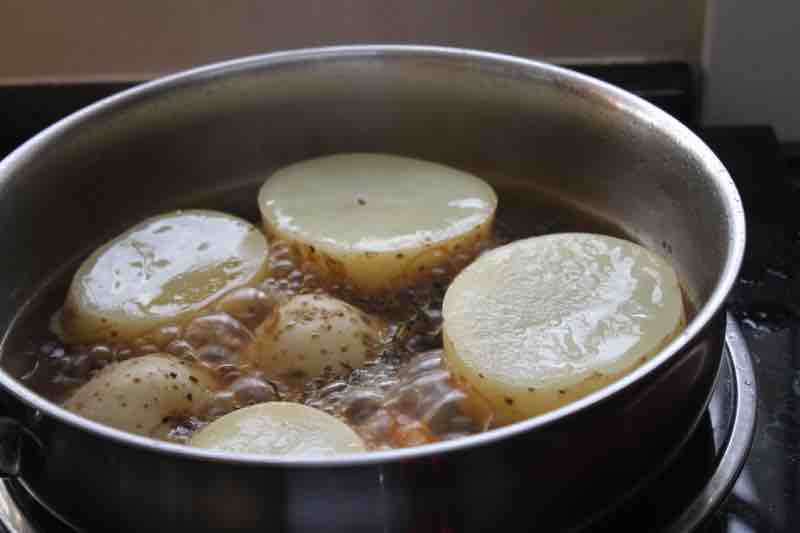
Ingredients
- New spuds; do extra so they will retrograde by the next meal.
- Butter; be generous.
- Herbs like thyme, oregano and garlic. Perhaps a cardamom-pod and a slither of chili would give the flavour you crave.
- Fresh slices of lemon.
Go for it
- Slice your spuds in half and place them cut-side down in a large shallow skillet with a lid.
- Add a good dollop of butter, a couple cloves of garlic and half a teaspoon of salt; a few sprigs of thyme and oregano.
- A slither of jalapeno would not go amiss in my book; or spicy peppadew oil[6].
- Add a few tablespoons of chicken stock.
- Boil for about fifteen minutes; then remove the lid and braise further until the water has steamed off.
- Once the spuds start to sizzle in the butter, remove any hard sprigs that remain of the herbs and add more garlic.
- Braise for another fifteen minutes until they are nice and crisp.
- Add the slices of lemon; and a handful of
chopped parsley or sprigs of oregano perhaps. Pour a tablespoon of olive oil over the
new potatoes and continue on moderate heat for another few minutes.
- Cool one half and refrigerate until tomorrow by which time the starch will have retrograded; reheat and you can enjoy them without guilt.
"When a potato is heated and then cooled a significant amount of the carbohydrate is retrograded into resistant starch. This means the effect on blood sugar is greatly dampened."
- Origins Medicine[3]
Frequently raised blood-glucose is now being fingered as one of the major causes of inflammation in the body and, in particular the veins and arteries; every organ is affected.
Heart surgeons are reporting that the inner linings of arteries are getting redder and more angry-looking than ever. Refined carbohydrates and potatoes from cold storage are at the core of the problem.
If you have a weight problem or are diabetic, then cool your braised new potatoes overnight and enjoy them reheated tomorrow; don't eat them hot immediately after cooking.
Remember that refrigerating any carbohydrate overnight causes the starch to retrograde; molecules link together making it more difficult for the enzymes in the small intestine to digest them.
The net result is a dampened blood glucose surge and only a minor need for pancreatic insulin; and so it is also less fattening as it is stored as glycogen rather than any excess as adipose tissue.
Instead that carbohydrate reaches the colon where beneficial bacteria feed on it greedily to produce many important byproducts; but little glucose. Read more about this at reheating resistant starch[1].
Let us state it candidly, if you want to live long in the land avoid processed carbohydrate; and in general keep your total starch to less than 150g per day.
Diabetics and the obese should be eating less than 50g per day, and even twenty grams if they are unstable.
Research from Tufts University shows the average American is consuming half a cup of sugar per day. Much of it is hidden in sauces, soups and cereals; that alone is 100g of carbs.
Much of it is often drunk in colas and so-called energy drinks.
Paraquat
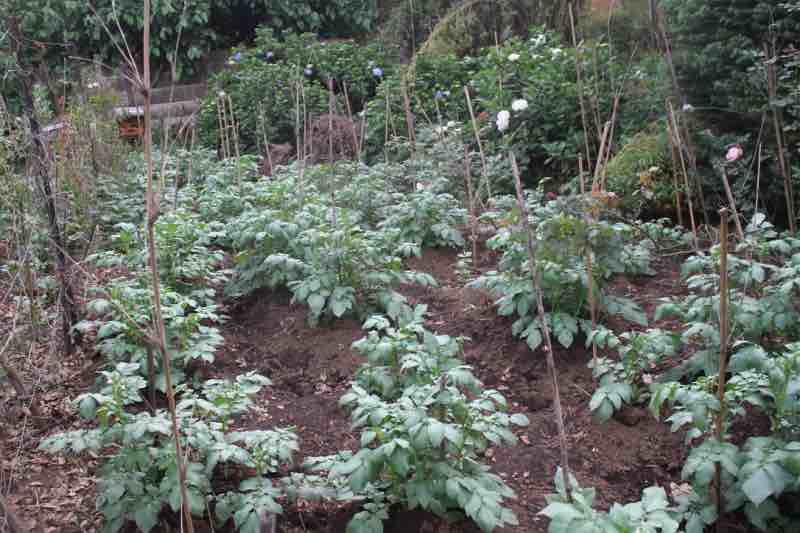
Routinely potatoes are sprayed with a herbicide called paraquat just before harvesting; the aim is to kill off the plant. Without a doubt residues remain in the spuds. I confess to being neurotically afraid of all these toxic poisons that we are exposed to.
With autoimmune-diseases and malignant neoplasms being rife in today's world I am so glad that we have resorted to planting our own potatoes.
This is our philosophy and we make no apology for it; we are convinced it is part of the reason why neither of us in our eighth decade are taking any medication and have not consulted a doctor for more than a year. Prevention always was and still is better than a cure.
Our focus is on what is known as blue zone longevity. It is certainly no guarantee that one will live to a happy and vibrant one hundred years but it will definitely shift the odds in your favour. Grow and braise your own new potatoes is our recommendation; chill and reheat them before eating if you are obese.
Potatoes are a good source of essential amino-acids such as lysine; but overall they contain only a small amount of protein.
Magnesium
Magnesium is an incredibly important mineral; it is required in over 300 biochemical reactions in the body. Less than half the people on the modern "industrial diet" are getting sufficient with many below 50% of the RDA. In particular it is associated with lower blood-pressure.
Potatoes have a remarkably high magnesium content; ten-times as much as most other vegetables[4]. However this benefit is almost completely lost in French Fries and chips.
Calcium
New potatoes are also an excellent source of calcium. Nevertheless because they are so difficult to get all year round, kefir remains our best recommendation for the mineral.
Braised new potatoes
Braised new potatoes have a lower glycemic index so there is less of a blood-sugar surge; they are deliciously crispy on the outside with soft centres.
They have a lot more water than those from cold-storage; experiment with how much liquid you should add.
Latkes too are of questionable merit. But those made with new potatoes and wholemeal flour not only taste better but can be enjoyed every week without guilt.
Healthy lifestyle
- Body mass index < 25
- Never having smoked
- High-quality diet
- Low commercial alcohol intake
- Regular exercise
- Adequate sleep
How does your lifestyle rate? If it's good then researchers have found you will have half the risk of Long Covid.
Regularly enjoying these braised new potatoes would certainly contribute to a high-quality diet; planting, heaping and harvesting them will also constitute regular exercise.
Unpasteurised natural alcoholic beverages
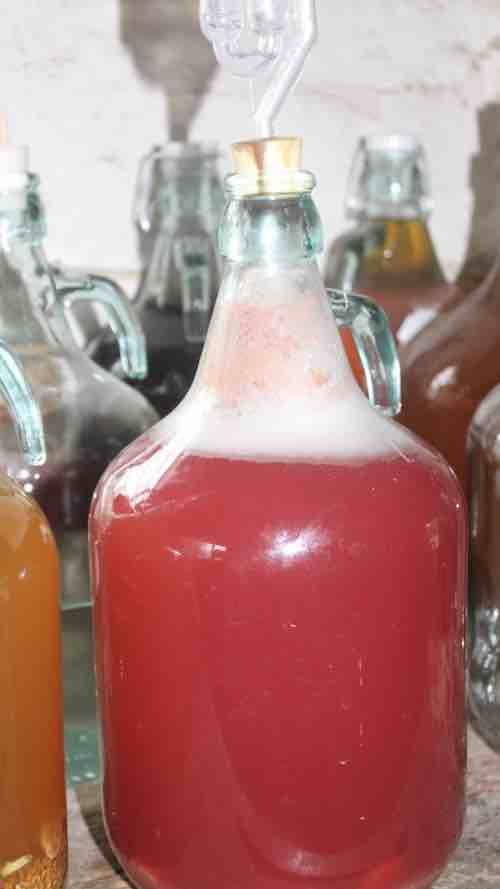
Researchers have clearly shown that even small amounts of commercial alcoholic beverages significantly raise the prevalence of cancer. For most of us that means making the time to brew your own beers, wines and ciders. Unpasteurised these natural drinks make excellent probiotics.
Of interest the folk in the Blue Zones of the world enjoy two or three natural drinks with their meals most days; but have ten times the chance of reaching a strong and zestful ninety.
No one knows whether vodka made from organic new potatoes would fall into the existing commercial alcohol world, to our detriment; or if it would turn out in moderation to contribute to longevity.
For those who do not enjoy being sick and taking pills the only alternative is to put more energy and time into an alternative lifestyle; like braised new potatoes especially if they are from your own garden. Slowly but surely the unwanted pounds fall off, we sleep better and have more energy for daily living.
Certainly the surge in malevolent metastatic cancers from the Paraquat used commercially to grow new potatoes would abate.
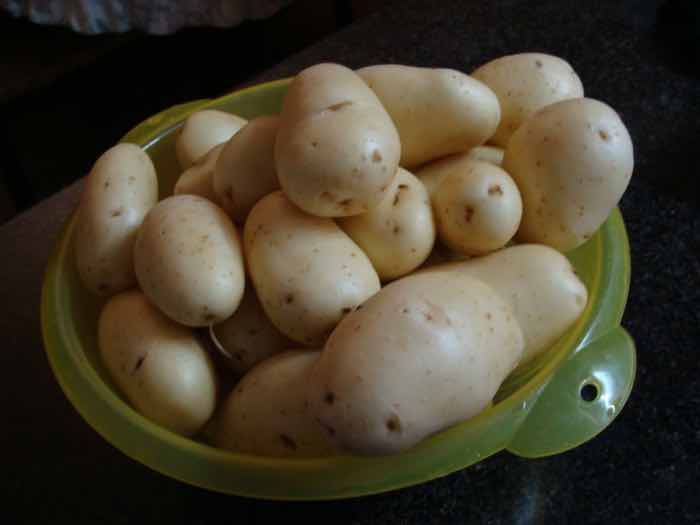 New potatoes are quite different
New potatoes are quite differentWhat is the healthiest way to eat potato?
There is alas no healthy way to eat potato from cold storage. In summertime look for those that have been newly-harvested; and find another starch in winter.
Boil them in their skins for the fibre and then braise them until crispy; in olive oil and perhaps a little butter.
Microwaved they still have a very high GI; they'll raise your blood glucose.
Best of all refrigerate them overnight so they can retrograde; then the GI drops dramatically. You can reheat them.
If you're a health nut and afraid of cancer, then grow them yourself. A wonderful food straight from the garden, high in fibre and important minerals.
Potato latkes
The world gives thanks to the Jewish community for latkes; mostly a starch fried in fat to celebrate the ancient tradition in which a small vial of oil kept a candle alight for eight days.
Potato latkes are relatively new to Jewish culture; since these gems from South America spread to the rest of the world about three centuries ago.
They are only as healthy as the newness of the potato and the wholeness of the flour used to bring the dough together; made of spuds from cold storage and cooked in solvent-extracted oils they are extremely fattening; fine for the eight days of Hanukkah but to be avoided thereafter.
But this best new potato latkes recipe ever is a gem; you could make it every week as long as there are new spuds to be lifted from the ground and not gain an ounce. They contain large amounts of resistant starch. Better still let them retrograde overnight and enjoy them cold.
Anyone who has been to Switzerland will certainly not forget the traditional potato rösti. To my mind it's one of the simplest recipes to cook; soft centres with a crispy munch.
And of course just over the border, mashed potato and sauerkraut makes one realise just how much more can be done with the humble spud to make it interesting and more nutritious.
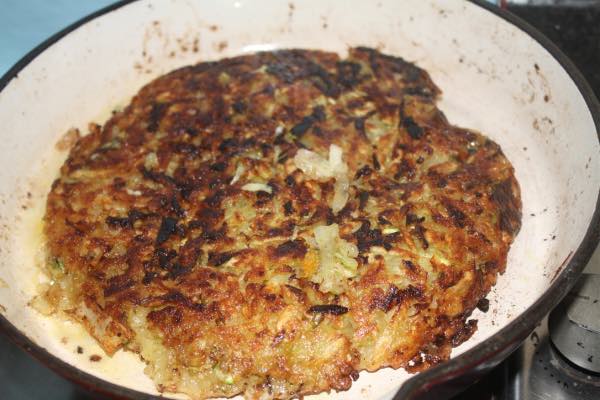 A slightly burned Swiss rösti
A slightly burned Swiss röstiWhen browsing use right click and "Open Link in New Tab" or you may get a bad gateway signal.
Newsletter
Our newsletter is entitled "create a cyan zone" at your home, preserving both yourself and Mother Earth for future generations; and the family too, of course. We promise not to spam you with daily emails promoting various products. You may get an occasional nudge to buy one of my books.
Here are the back issues.
- Lifestyle and ideal body weight
- What are ultra-processed foods?
- Investing in long-term health
- Diseases from plastic exposure
- Intensive lifestyle management for obesity has limited value
- A world largely devoid of Parkinson's Disease
- The impact of friendly bacteria in the tum on the prevention of cancer
- There's a hole in the bucket
- Everyone is talking about weight loss drugs
- Pull the sweet tooth
- If you suffer from heartburn plant a susu
- Refined maize meal and stunting
- Should agriculture and industry get priority for water and electricity?
- Nature is calling
- Mill your own flour
- Bake your own sourdough bread
- Microplastics from our water
- Alternative types of water storage
- Wear your clothes out
- Comfort foods
- Create a bee-friendly environment
- Go to bed slightly hungry
- Keep bees
- Blue zone folk are religious
- Reduce plastic waste
- Family is important
- What can go in compost?
- Grow broad beans for longevity
- Harvest and store sunshine
- Blue zone exercise
- Harvest and store your rainwater
- Create a cyan zone at your home
Did you find this page interesting? How about forwarding it to a friendly book or food junkie? Better still, a social media tick would help.
- Bernard Preston homepage
- Potatoes
- Braised New Potatoes
Address:
56 Groenekloof Rd,
Hilton, KZN
South Africa
Website:
https://www.bernard-preston.com